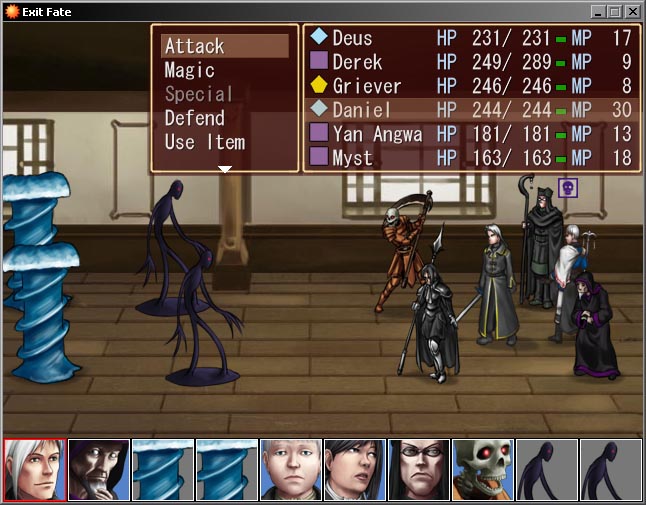IndiE3, if you didn't know, was a free cyber indie game dev expo that ran parallel to
E3 last week. Throughout the week, a group of volunteers in Seattle live streamed indie game trailers and panel discussions. As I
previously wrote, I had lost my initial pep for the event a couple of days in, and I missed the end of the event due to wedding attendance, so I didn't find the event fulfilling in terms of raw content. Of course, there were some high points: I caught the end of a fantastic interview with
Christine Love on representations of sex in games, was introduced to some cool games through
Warpdoor's panel, and saw some intriguing trailers. Sadly, I missed most of the panels, and wasn't very interested in most of the games shown. That being said, IndiE3 is still damn worth celebrating.
Never before have I heard of an international cultural expo being so inclusive. Do you want to attend IndiE3? All you have to do is sit in front of your computer in time for the live stream and chat as it happens. Do you want your game featured? It doesn't matter who you are or what your game is - send an email, and it
will be shown, for
goddamn free. Want to talk in front of an audience of hundreds? Again, it doesn't matter who you are - send an email, and
you can host your own fuckin' panel. About just about
anything. Yes,
you.
Do you know how cool that is? THAT'S FUCKING ICE COLD.
Just about every other game expo, such as E3, is rife with barriers to entry. It costs ahellovalota money to book a flight, crash in a hotel, and attend the event. E3 itself is open only to industry professionals, and being able to host a talk requires an even greater level of pre-existing legitimacy. So, through these sort of conventions, a relatively small group of people (technically skilled college-educated white men who like videogames just fine the way they are) gain reinforced status as the elite creators of games. Dominant discourse about games is limited to this group, and remains relatively stagnant.
At this year's E3, the games we see are the
same old violent games with white male macho protagonists*. I mean that literally: it seems as though at least half of the new releases I encountered are sequels, spinoffs, or reboots. Mainstream games simply haven't responded to much of the social, narrative, or even ludological criticism that those of us on the fringe have been slinging at them. Games are capable of exploring as wide a variety of human experience as any other entertainment medium, yet so far have only explored a small fraction of it. Mainstream games have so much growing they can do, yet grow so little.
Compare this to IndiE3. While most people involved with the event were men, I noticed a greater diversity of individuals than typically is associated with gaming. Not only that, but panelists seemed to be greatly concerned with social and economic criticisms of games and their production. Panel topics included: "Games have a Racism Problem," "Creating Games Under Capital," and "What Not to do with Native Americans in Videogames." Other panels were more critical of dominant design philosophy and storytelling in games, but even these panels had a socially conscious edge: one panel I overheard on "Designing RPGs without Combat" was critical of how relationships and sex were portrayed in most RPGs.
Now, of course, with such low barriers to participation in IndiE3, you're bound to get some pretty awful games showcased. Some of the games honestly looked a little like the stuff I made in middle school. That being said, there were tons of really cool games too, such as
Unrest,
There Shall be Lancing,
Charlotte Seeker, and
Witchmarsh. What's more, the ability for anyone, regardless of their background, to have their creative work broadcasted to over a thousand people around the world, with no strings attached, it amazing. It's an opportunity that, under capitalism, is incredibly rare.
That's essentially what makes IndiE3 so special. The mainstream games industry, and all of the expos associated with it, are capitalist institutions to their foundation. IndiE3, by removing all economic and social barriers to participation to it, is fundamentally critical and egalitarian. It's what a game convention looks like if designed by anarcho-socialists.
Considering the results, that's fine by me.
----------------------------------------------------------
I'd also like to briefly share some more personal notes on my IndiE3 experience. Digital Toilet World, unfortunately, was not shown during the Warpdoor showcase as promised - the live streamer progressed through the list of games rather slowly and only played about half of it.
Toward the end of the event, a volunteer finally confirmed that they had received promotional materials for Waker, but, because of the aforementioned wedding, I missed the trailer showing. I'm currently having trouble finding and viewing its recorded video segment.
Overall, I think that, since the event was planned over a weekend by volunteers with no budget, it was stronger as a proof of concept than as an actual event. Poor communication and lack of manpower posed problems throughout. However, most of the issues were resolved over the course of the week, meaning that, if IndiE3 happens next year, it'll be as as strong as a magical flying ox. Bad ass.
------------------------------------------------------------
Please feel free to talk to me about IndiE3, the intersection between gaming and social justice, or anything else. I covered a lot of subject matter in this and didn't go into much detail about any of it. Hit me up.
*Seriously scroll back up and watch the video in the link before the asterisk. This is what gaming mostly is. We all know it, there's no excuse for it, and it's gotten boring.





